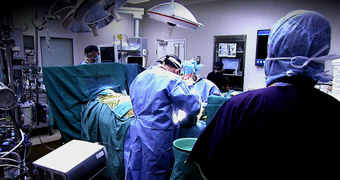The doctor who first raised allegations about bullying and harassment amongst surgeons says she is shocked at the extent of bad behaviour revealed in a new report.
The report, commissioned by the Royal Australasian College of Surgeons (RACS), found nearly half of all surgeons across all specialities have experienced discrimination, bullying or sexual harassment.
It was commissioned after vascular surgeon Dr Gabrielle McMullin said complaining about harassment could ruin a trainee’s career.
Dr McMullin said she was saddened by the results.
“I wasn’t probably aware of the degree of the problem,” she said.
“It’s a great deal more prevalent than I thought it was both for men and women. It’s surprised me how many men have been damaged.”
The report found bullying was the most common, reported by almost 40 per cent of surgical fellows, trainees and international medical graduates.
Almost 20 per cent of surgeons reported discrimination and workplace harassment, with 7 per cent detailing instances of sexual harassment.
The most prevalent form of discrimination was cultural, with one response reading: “They want you out of the country or they want you dead.”
RACS president Professor David Watters has written a formal apology to all those who suffered bullying, discrimination or sexual harassment.
“The individuals who shared their stories have described the devastating impact this has had on their personal and professional lives,” Professor Watters said.
Dr McMullin said she was heartened by the College of Surgeons’ response.
“I think they’re saying all the right things. The problem is whether that will be followed up by action,” she said.
“The major problem is that there is a very powerful group of extremely powerful men at the top of this whole thing that are almost untouchable.”
Bullying not confined to surgeons: students
The Australian Medical Students’ Association said the problem of bullying and harassment was not unique to the surgical profession.
Association president James Lawler said the recommendations should be implemented across all medical colleges.
Four Corners: At Their Mercy

A toxic culture of belittling, bullying and bastardisation is poisoning the lives of young trainee doctors in some of our major teaching hospitals.
“I would hope that all medical colleges heed the report. I don’t think other areas of medicine are without bullying, harassment or discrimination,” he said.
“We’d be blind to think it doesn’t happen elsewhere.”
The report’s findings have been welcomed by medical groups.
Dr Victoria Atkinson from St Vincent’s Health Australia said she believed it would create meaningful change.
“Really facing up to some of the ugly conversations that need to happen has given me enormous hope because what they’ve done is made the point that there’s no way back,” she said.
“When you put something out there like this, you’re compelled to move forward. And I think that I’m incredibly optimistic.”
The College of Surgeons has accepted all the report’s findings and promised an action plan by November.
Changes will include increasing transparency and external scrutiny of the college, making it safe for people to make a complaint and improving surgical education and training.
